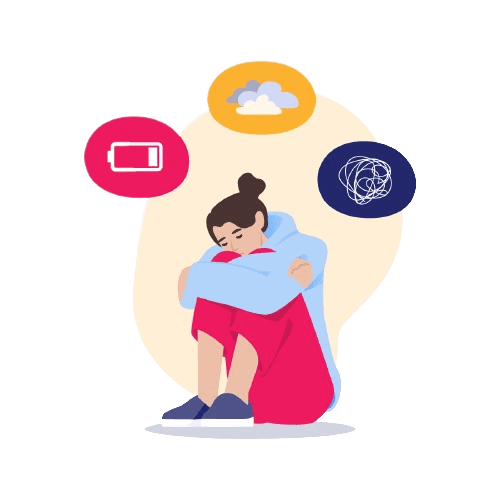Memory Assessment
3 Min Free Memory Assessment
What are Memory Issues?
Memory issues refer to difficulties in various aspects of memory function, including the encoding, storage, and retrieval of information. Individuals with memory issues may experience challenges in retaining and recalling information accurately and efficiently.
Memory issues can be associated with various factors, including normal aging, stress, medical conditions (e.g., dementia, traumatic brain injury), mental health disorders, or medication side effects. It’s important to consult with a healthcare professional or specialist for an accurate diagnosis and appropriate treatment recommendations.
Strategies such as implementing memory aids, maintaining a structured routine, engaging in mental exercises, practicing good sleep habits, managing stress, and seeking support through therapy or counseling can help individuals manage memory issues and enhance their memory functioning.

Symptoms of Memory Issues
The symptoms of depression can vary from person to person, but they often include:
- Forgetfulness
- Difficulty Learning New Information
- Word-Finding Problems
- Misplacing Objects
- Difficulty Remembering Instructions
- Poor Recall of Recent Conversations
- Difficulty Remembering Past Events
- Recurring Questions
- Trouble Recognizing Faces or Names
- Memory Lapses in Time and Place
- Decreased Ability to Multitask
- Reliance on External Reminders

Who Can Benefit From This Memory Assessment?
The Memory Assessment can benefit individuals who suspect they may be experiencing memory issues or have concerns about their ability to retain and recall information accurately. It is valuable for those who want to evaluate the presence and severity of memory difficulties and assess the impact on their daily functioning, productivity, and quality of life. The assessment can also be helpful for friends, family members, or caregivers who want to understand the potential symptoms and challenges associated with memory issues.
By completing the Memory Assessment, individuals can gain insights into their memory capabilities, assess the need for further evaluation or intervention, and make informed decisions about seeking appropriate help. It serves as a starting point for discussions with healthcare professionals, neurologists, psychologists, or therapists for further evaluation, diagnosis, and treatment options.
Types of Memory Assessment
Verbal and Visual Memory Tasks
These tasks involve the recall and recognition of verbal or visual information presented in different formats, such as word lists, stories, or images. They assess an individual’s ability to encode, store, and retrieve specific types of information.
Memory Screening Tools
Short and standardized screening tools, such as the Mini-Mental State Examination (MMSE) or the Montreal Cognitive Assessment (MoCA), are commonly used to provide a quick assessment of overall cognitive functioning, including memory.
Digit Span Tests
These tests assess an individual’s working memory capacity by measuring their ability to recall and repeat a series of digits in the same or reverse order. They evaluate short-term memory and attention span.
Neuropsychological Tests
Comprehensive neuropsychological assessments evaluate multiple cognitive domains, including memory. These tests involve various tasks and measures to assess different aspects of memory, such as immediate recall, delayed recall, recognition, and working memory.
Memory Questionnaires
Self-report measures and structured interviews, such as the Memory Assessment Clinics Questionnaire (MAC-Q) or the Memory Complaint Questionnaire (MAC-Q), gather information about an individual’s subjective experiences of memory difficulties &their impact on daily life.
Brain Imaging Techniques
Brain imaging techniques, such as magnetic resonance imaging (MRI) or positron emission tomography (PET), may be used to assess brain structure and function. These techniques can provide insights into potential structural abnormalities or changes in regions associated with memory.
Treating Memory Issues
Treating memory issues involves addressing the underlying causes of the problem and implementing strategies to improve memory function. Here are common approaches used to address memory issues:
- Lifestyle Modifications: Adopting a healthy lifestyle can support optimal brain function and enhance memory. This includes engaging in regular physical exercise, maintaining a balanced diet rich in nutrients, getting sufficient sleep, and managing stress effectively.
- Memory Training and Cognitive Rehabilitation: Engaging in memory training programs or cognitive rehabilitation exercises that specifically target memory function. These programs involve practicing memory techniques, such as mnemonic strategies, visualization, chunking, or spaced repetition, to improve memory encoding, storage, and retrieval.
- Cognitive Stimulation: Engaging in activities that challenge and stimulate the brain, such as puzzles, reading, learning new skills or languages, and participating in mentally stimulating games or activities. These activities help keep the brain active and promote cognitive functioning, including memory.
- External Memory Aids: Using external aids, such as calendars, planners, reminder apps, and digital devices, to compensate for memory difficulties. These aids can assist with organizing tasks, appointments, and important information to reduce reliance on memory alone.
- Memory Techniques and Strategies: Learning and implementing memory techniques and strategies to enhance memory performance. This may include using visualization, association, repetition, or creating mnemonics to improve memory encoding and retrieval.
- Medication: In some cases, medication may be prescribed to manage memory issues associated with specific medical conditions, such as dementia or Alzheimer’s disease. Medication decisions should be made in consultation with a healthcare professional.
- Psychoeducation and Support: Educating individuals and their families about memory issues and providing support and guidance in managing memory difficulties. This may involve teaching compensatory strategies, stress management techniques, and providing emotional support.
- Environment Modification: Modifying the environment to reduce memory demands and support memory function. This includes organizing physical spaces, creating routines, using labels or signs, and reducing distractions to enhance focus and memory retrieval.
It’s important to note that treatment for memory issues should be tailored to the underlying causes and individual needs. Collaboration with healthcare professionals, neurologists, psychologists, therapists, or specialists trained in memory rehabilitation can provide comprehensive support and guidance in developing personalized strategies to address memory issues and optimize memory functioning.

